Full list of texts
anon.
Ten Million
Returning members of the Venceremos Cane Cutting Brigade encountered their comrades who will take up the work of the first contingent of the brigade in the sugar cane fields of Cuba. The Venceremos Brigade is a group of young Americans who have been and will continue to be participating in the Cuban sugar harvest of 1970, now known internationally as the Battle for the Ten Million Tons.
Nov 26, 2023 Read the whole text...
john johnson
Tennescene
Long time readers of the Fifth Estate will remember the section called “Detroit Seen” which brought news from the radical scene in Detroit. We hope to continue “scene” reports in the new incarnation of the Fifth Estate.
Howdy y’all! (The Eco-Anarcho-Communalist Faction of the Society for the Preservation of the Good Parts of Southern Culture officially declares “y’all” a new, non-sexist alternative for addressing groups. People who still say “you guys” are obviously not concerned with preservation of our fine language, or worse, they are yankees.)
May 27, 2021 Read the whole text...
Fifth Estate Collective
Upside Down Culture Collective
Tennescene: Radical Actions & Summer Tours Deep in the Bible Belt
This summer, the Rule of Thirds recently dubbed by the Nashville Scene as a “subversive art space”—played host to numerous politically proactive collectives. June saw the educational and entertaining Upside Down Culture Collective hailing from our other outpost: Detroit. They shared a mix of radical art history, puppetry, music, and readings, in promotion for their newly released book All the Days After, a collection of art and poetry ranging from creatively pissed off to outright heart wrenching, in response to the events on and after September 11th. These guys are warm, funny, and intelligent: turning a culture upside down in a city near you or at
Nov 9, 2017 Read the whole text...
MaxZine Weinstein
Tennessee Radicals Resist the Permanent Nuclear War Machine at Oak Ridge
A few months ago, George W. Bush proclaimed that 2002 would be a “war year.” Indeed, the so-called “War Against Terrorism” promises war without end. Still, the President has not hesitated in making superficial gestures towards “peace.” The latest of these is the recent nuclear arms reduction treaty signed with Russian President Vladimir Putin. The treaty will not dismantle a single weapon, simply move some into storage.
May 6, 2021 Read the whole text...
David Solnit
Tenth Anniversary of Bolivia’s Water War
Report from the World People’s Conference on Climate Change in Bolivia
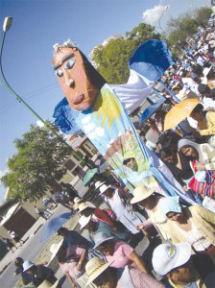
--photo Mona Caron
In spring 2000, the people of Cochabamba, Bolivia rose up against the privatization of their water, forcing out the US based corporation, Bechtel, and Bolivia’s neo-liberal government to back down. The rebellion opened up new political space in Bolivia, catalyzing the most powerful, radical, visionary mass movements and mobilizations on the planet. My friend and collaborator, Mona Caron, a public muralist from San Francisco, and I spent six weeks in Cochabamba, a city in central Bolivia, during March and April co-creating art and visuals with local communities and organizations. We came at the invitation of the organizing committee for the International Feria del Agua (Water Fair) commemorating the ten year anniversary of what has come to be known as the Water War. We also participated with 30,000 others in the World People’s Conference on Climate Change and the Rights of Mother Earth, organized by the Bolivian government of President Evo Morales.
Jan 25, 2014 Read the whole text...
W.B. Jeffries (Fredy Perlman)
Ten Theses on the Proliferation of Egocrats
The Egocrat—Mao, Stalin, Hitler, Kim Il Sung—is not an accident or an aberration or an irruption of irrationality; he is a personification of the relations of the existing social order.
The Egocrat is initially an individual, like everyone else: mute and powerless in this society without community or communication, victimized by the spectacle, “the existing order’s uninterrupted discourse about itself, its laudatory monologue, the self-portrait of power in the epoch of its totalitarian management of the conditions of existence.” (Debord) Repelled by the spectacle, he longs for “the liberated human being, a being who is at once a social being and a Gemeinwesen.” (Camatte) If his longing were expressed in practice: at his workplace, in the street, wherever the spectacle robs him of his humanity, he would become a rebel.
Feb 17, 2018 Read the whole text...
Gareth Henry
Ten Years As An Undercover Nazi
a review of
Codename Arthur: The true story of the anti-fascist spy who identified the London nailbomber by Nick Lowles. Partisan Books 2021
Codename Arthur is both a tribute to “Arthur,” an anti-fascist spy who spent a staggering 10 years undercover in the nascent far-right British National Party (BNP) during the 1990s and 2000s, facing the constant threat of exposure.
Jan 1, 2022 Read the whole text...
Fifth Estate Collective
Ten Years of Montreal’s Mauvaise Herbe
The Montreal zine and distro, Mauvaise Herbe (MH; The Weed), celebrated its tenth anniversary in 2011. The journal, with its green and anarchist insurrectionist influences, prints articles in French and English, was first to publish this perspective in French in Quebec.
Since 2002, Mauvaise regularly presents workshops at the annual Montreal Anarchist Bookfair and at other events including the city’s Eco-radical festival. The topics include anarchism and the anti-civ critique, the question of organization, the concept of autonomy, and on the challenges to Quebec’s eco-radical movement.
Oct 17, 2013 Read the whole text...
Norman Bates
Terrorism & Media
“Is any given bombing...the work of leftist extremists, or of extreme right-wing provocation, or staged by centrists to bring every terrorist extreme into disrepute and to shore up its own failing power, or again, is it a police-inspired scenario in order to appeal to public security? All this is equally true and the search for proof, indeed the objectivity of the fact does not check this vertigo of interpretation. We are in a logic of simulation which has nothing to do with a logic of facts and an order of reasons.”
--Jean Baudrillard, Simulations
Dec 16, 2017 Read the whole text...
Fifth Estate Collective
Terrorism in the Home
Early Detection
LNS/Peoples News Service, London — As part of its ongoing hysteria campaign against both “terrorists” and their “sympathizers” (that is, literally, anybody who refuses to condemn the “terrorists”), West Germany’s notorious Bild Zeitung (a Springer newspaper) has now offered its readers a chance to predict whether their children will wind up on the most wanted list some day.
Jun 10, 2018 Read the whole text...
Alan Franklin
Terrorism: The State Marches On
From South Africa comes the news that what even conservative observers took to be a very bad joke on the part of “Justice” Minister Jimmy Kruger turns out, on closer analysis, to be the certified honest-to-god truth.
Kruger had expressed complete ignorance of the source of the ‘train damage which had brought about the death of imprisoned black resister Steven Bike, suggesting that if as Kruger suspected, Biko’s head injuries were self-inflicted, he could nonetheless sympathize with the unfortunate man because he often felt the strains of his job to be akin to “banging my head against the wall.”
Mar 19, 2018 Read the whole text...
Margie Stamberg
Terrorists Invade Bridal Fair
NEW YORK (Liberation News Service/Guardian) “Love starts at Chase Manhattan,” said the psychedelic lettering on the plastic shopping bags given to the girls attending New York’s first Bridal Fair at Madison Square Garden on Valentine’s Day weekend.
In a back stairwell, house dicks, rent-a-cops, some of the city red squad and independent heavies had isolated 10 radical women who were disrupting the day’s slave trade and were busy throwing them down the steps, slamming them up against concrete walls, twisting their arms, and screaming, “You’re sick, you’re sick, you’re sick.”
Sep 3, 2021 Read the whole text...
anon.
Terrorists’ Revenge
While waiting at a traffic light in the city of Karlsruhe, West Germany, Chief Prosecutor Siegfried Buback was assassinated just as the light turned green.
Along with his chauffer and a bodyguard, Buback was killed by two people riding a stolen motorcycle, when they drove up to the right side of his limousine and emptied more than thirteen shots into the car with a submachine-gun.
Oct 13, 2016 Read the whole text...
Tomas MacSheoin
Test-tube People
a review of
Test-Tube Women, What Future for Motherhood? Rita Arditti et. al., Pandora Press, 482 pages.
“Human beings will end their second millennium since Christ perfecting the means to tamper, for the first time, with their own nature and existence,” The Economist of London editorialized recently. And it is hard to imagine an area more important for political debate and action than this one which will determine the fate of our children and their children.
Sep 26, 2020 Read the whole text...
Fifth Estate Collective
Texas Anti-Nuke Activist Murdered
The ambush-style shooting death of an anti-nuclear activist in Houston, in April, has sent waves of alarm through the Texas anti-nuclear community. The victim of the assault was 28-year-old Michael Eakin, who was formerly the editor of the University of Texas newspaper and founder of the Austin Sun, a weekly alternative paper.
Sep 25, 2018 Read the whole text...
Fifth Estate Collective
Texas Anti-Prison Gathering Set for June
A second Convergence Against Toxic Prisons will take place June 2–5, 2017 in Fort Worth, Tex., the city where the Carswell Federal Medical Center is located. The gathering will feature speakers, panels, workshops, protests and cultural activities, including an art show and hip-hop performances, and demonstrations.
May 16, 2017 Read the whole text...
Fifth Estate Collective
Thank you!
Fundraising & benefits bring in needed cash
Since the Fifth Estate refuses to publish the voice of capital, advertisements—the normal source of financing ‘newspapers—we depend on you through your subscriptions, newsstand purchases, and donations to insure our survival.
This issue was made possible through a combination of the above sources as well as a series of regional benefits held on our behalf. The most recent ones occurred in Chattanooga, Asheville, “Punk-n-holler,” and Detroit and combined raised over $1000, with $850 coming from the latter event alone. This provided us with almost half of what we needed to print, mail, and ship this issue. So, thanks to the many performers, organizers, and attendees who made them so successful.
Nov 9, 2017 Read the whole text...
Fifth Estate Collective
The 1988 Election
Nobody Won!
The 1988 Presidential electoral farce was all over by midnight on Tuesday, Nov. 8. Vice-President George Bush victoriously declared, “The people have spoken.”
Bush was right in one regard: the people had spoken but in a manner reported virtually nowhere. Those eligible to vote avoided the polls in record numbers to the point where Nobody won an absolute majority among the potential electorate for the first time in 64 years.
Dec 28, 2020 Read the whole text...
Peter Werbe
The 2020 Election
What to do while waiting for the Revolution
The 2020 Michigan presidential primary on March 10 marked the end of the progressive fantasy that the American political landscape could be altered by supporting U.S. Senator Bernie Sanders as the Democratic Party nominee.
Instead, it was bye-bye, Bernie, as Joe Biden swept every county in the state as voters overwhelmingly went for a candidate they thought had the best chance of defeating the execrable Trump in November.
Apr 10, 2020 Read the whole text...
Fifth Estate Collective
The 26th of March
National days of protest March 25–26 constituted the largest concerted world-wide action for peace in history. Demonstrations to protest the war in Vietnam took place in 30 countries, according to the National Coordinating Committee to End the War in Vietnam—initiator of the campaign.
In the United States, the protests surpassed those called by the NCV last October, indicating that the anti-war movement has grown significantly in response to the Johnson Administration’s escalation of U.S. intervention in Vietnam.
Sep 3, 2015 Read the whole text...
Tad Zatlyn
The 400 Blows
Film Review
In THE 400 BLOWS, recent feature at the Varsity Theater, Francois Truffaut telescopes in on one small but very human subject, picking up the story almost at the height of its conflict, rather than methodically building up to it, which might very well have been the “soundest” way to attack the story. Free of the conventional straight jacket of getting in the proper exposition at the proper time, and also acting this exposition out, he is able to give us a greater human close-up. It is as if he were applying a zoom lens to the entire script. And at the final scene, which is the height of the close up, he frames on the face of the boy. Nothing is really resolved--as in life things seldom are.
Jan 14, 2014 Read the whole text...
Bernard Marszalek
The ‘60s, 40 Years Later
No Chicago in Denver
Forty years ago, like today, the country found itself in an unpopular war of imperial domination to vanquish, not “Islamo-Fascism,” but Communism. And, like then, the political system was thoroughly corrupt and in the hands of a cabal of stooges with nightmarish plans.
Like so many others, when an election year rolls around and party politics rules the “news” with its loathsome trivia and journalistic manipulations, I long for refuge in an idyllic retreat deep in a forest far away from all media. But that isn’t an option for me, nor, I suspect for most people.
Aug 21, 2014 Read the whole text...
the Curious George Brigade
The Abolition of Outreach
The following is an excerpt from Anarchy in the Age of Dinosaurs by the Curious George Brigade (see facing page for a review). For more information, see www.ageofdinosaurs.net or contact yellowjack@ageofdinosaurs.net
Race is an issue that has long scared and perplexed radicals in the US. White anarchists today are especially dismayed by a lack of racial diversity, especially of blacks, among the folks who join them in the streets and collective work.
Aug 20, 2017 Read the whole text...
Fifth Estate Collective
The Absurdity of Politics (cover text)
The voter is a man who comes where he is summoned one day like a flunkey, to one who whistles for him as for a dog trained to obey, who comes on the said day only and not on any other day. He is a man who comes when authority says: “The moment is here to sanction one more time a system established by others and for others than yourself.
Nov 17, 2014 Read the whole text...
Jerry Rubin
The Academy Award of Protest
This is the greatest honor of my life. It is with sincere humility that I accept this federal indictment. It is the fulfillment of childhood dreams, climaxing years of hard work and fun.
I wish to thank all those who made it possible: my mother, my father, brother, wife Nancy, Stew and Gumbo, Spartacus, Tom Paine, the Boston Tea Party, Ho, Che, Fidel, Huey, Eldridge, Lenny Bruce. Walter Cronkite, and last but not least—Richard J. Daley.
May 7, 2022 Read the whole text...
Jim Feast
The African Road to Anarchism?
Will the collapse of government rule in countries like The Gambia lead to... The African Road to Anarchism?
My experiences on a recent trip to The Gambia on Africa’s west-central coast, brought to mind the historic leftist dream that the state will wither away once workers have overturned capitalism.
Here’s an irony of history. In the last 15 years, in the industrially undeveloped world, the state has withered away, not because of its supersession, but due to the extension of global capitalism. Talk of state collapse on capital’s periphery doesn’t mean governments have completely vanished, but that many states have diminished from being the totalized agencies of control we experience in Northern tier countries.
Aug 19, 2014 Read the whole text...
Fifth Estate Collective
The Aftermath of Toronto’s Anti-G20 Demos
A legal circus and the criminalization of dissent
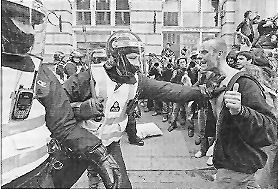
In a packed Toronto courtroom, November 23, the prosecution dropped all conspiracy charges against the so-called “Main G20 Conspiracy Group,” 17 organizers from Southern Ontario and Quebec.
The G20 Summit, a meeting of international finance ministers held in Toronto in June 2010, was met with huge protests, followed by unprecedented mass arrests: 1105 people detained, and over 300 charged. Countless others were targets of police brutality and violations of fundamental human rights. Of those charged, almost 200 had charges dropped.
Oct 17, 2013 Read the whole text...
Peter Lamborn Wilson
The Alchemy of Luddism
for Diane di Prima
St. John’s Eve (Midsummer) 2006
It’s the idea
of code that’s cool not the actual
bother of decipherment: the utopia
of not having been in a state of
anticipation or regret. The Dowager Empress
took fresh honeysuckle petals in her green tea — yes even Civilization had its finer moments
Mar 28, 2015 Read the whole text...
Steven Cline
The Alchemy of Revolt
NIGREDO
Our darkening world has dressed itself up in vestment of blue Void. Has lain on its self-discrowned head the lazy eyelid corpse. Vacuum abhorrent naturam. That’s what they say. What they say. Forests burn in a world that has become an alchemist’s fire. In this stage, our naked feet are frozen, are hard. And we watch with drooping gaze a silent shadow, drifting allway over Deep. Hope? The hidden bedbug, mere bit of lice. And the Spectacle has hired itself a team of talented, well-trained exterminators. We are vampirized by our own atmospheres here, sucked well and through by selfset traps.
Aug 20, 2024 Read the whole text...
David Watson
The Algebra of Need
“Junk yields a basic formula of ‘evil’ virus: The Algebra of Need. The face of ‘evil’ is always the face of total need. A dope fiend is a man in total need of dope. Beyond a certain frequency need knows absolutely no limit or control. In the words of total need: ‘Wouldn’t you?’ Yes you would. You would lie, cheat, inform on your friends, steal, do anything to satisfy total need. Because you would be in a state of total sickness, total possession, and not in a position to act in any other way. Dope fiends are sick people who cannot act other than they do. A rabid dog cannot choose but bite. Assuming a self-righteous position is nothing to the purpose unless your purpose be to keep the junk virus in operation. And junk is a big industry... I lived in one room in the Native Quarter of Tangier. I had not taken a bath in a year nor changed my clothes or removed them except to stick a needle every hour in the fibrous grey wooden flesh of terminal addiction. I never cleaned or dusted the room. Empty ampule boxes and garbage piled to the ceiling. Light and water long since turned off for non-payment. I did absolutely nothing. I could look at the end of my shoe for eight hours. I was only roused to action when the hourglass of junk ran out. If a friend came to visit—and they rarely did since who or what was left to visit—I sat there not caring that he had entered my field of vision—a grey screen always blanker and fainter—and not caring when he walked out of it. If he had died on the spot I would have sat there looking at my shoe waiting to go through his pockets. Wouldn’t you? Because I never had enough junk—no one does.”
Jul 16, 2025 Read the whole text...
James D. Nixon
The Algiers Motel Incident
book review
a review of
The Algiers Motel Incident by John Hersey. 397 pages, Hardbound, $5.95 Alfred A. Knopf, Inc. Paperback, $1.25, Bantam Books
Language is loaded with euphemisms, and the title of John Hersey’s The Algiers Motel Incident is a prime example. “Algiers” suggests an Afro-orientation, but “Incident” is the stinger. Albert Cleage writes of “the Algiers motel massacre”, and in mid-August of 1967 Doc Greene began a Detroit News column with a sentence which contained a likely title: “The thing that gets me about the Algiers Motel slayings of Aubrey Pollard, Fred Temple, and Carl Cooper is the superb manner in which the police set about solving these homicides.” The irony builds in that article.
Jul 20, 2015 Read the whole text...
Fifth Estate Collective
The American Dream
A Synthetic Society
“Plastic settled in river
“SARNIA, Ontario—A cloud of plastic powder that was released into the air and settled in the St. Clair River poses no health threat, says a Canadian spokesman for the Midland-based Dow Chemical Co.
“The estimated 4,000 pounds of the polyethylene powder used to make milk jugs accidentally was released by the company about 10 p.m. Thursday, Dow Chemical Canada Inc. spokesman John Musser said Friday.
Dec 15, 2017 Read the whole text...
Various Authors
The Amish, “Obnoxious Machinery” & Community
an exchange
In response to “Secular Antinomian Anabaptist Neo-Luddism,” FE #372, Spring, 2006]
Dear Fifth Estate,
When I saw the cover of FE which promised an article on the Amish and Anarchists, it piqued my interest. I live in Amish country, Pennsylvania. An Old Order Amish family are my next door neighbors.
Apr 4, 2015 Read the whole text...
Bill Weinberg
The Anarchist Alternative in Cuba
A former community center that hosted a youth rock scene is now being occupied by activists, seemingly ignored by the authorities. A few blocks away, urban farms are bright patches of green in the landscape, producing vegetables and fruits for the community.
Oakland? Detroit? Manhattan’s Lower East Side?
Oct 31, 2017 Read the whole text...
Robert Knox
The Anarchist Poet of Exarcheia
What We’re Gonna Do Is Read Her Poems
a review of
Now Let’s See What You’re Gonna Do: Poems 1978–2002 by Katerina Gogou; translation by A.S., forward by Jack Hirschman. fmsbw press 2021
A biographer of Katerina Gogou terms her “the anarchist poetess of Exarcheia,” the so-called “edgy alternative” Athenian neighborhood with its political murals and anarchist bookshops. I have been to Athens, once, but the tour guides never pointed us that way. So, I will take on faith a biographer’s description of Gogou, who died in 1993 by her own hand, as “Greece’s greatest anarchist poetess.”
Dec 6, 2021 Read the whole text...
Murray Bookchin
Dena Clamage
The Anarchist Revolution
Interview with Murray Bookchin
Murray Bookchin is the editor of Anarchos magazine, a periodically appearing journal of anarchist thought published in New York City. Copies of his magazine and other writings are available from Anarchos, P.O. Box 466, Peter Stuyvesant Station, N.Y., N.Y. 10009 or may be picked up in person only at the Fifth Estate office.
May 6, 2019 Read the whole text...
David Porter
The Anarchist Spectre in Eastern Europe
As Old Regimes Collapse
Rarely is an entire region of the world so caught up in the collapse of hierarchical politics as Eastern Europe of a year ago. The infamous “spectre of anarchy” astonished and horrified Communist, dissident and Western politicians alike as millions suddenly demanded control of their own lives. [1]
Tragically, but predictably, politicians of all sides—Party members and bureaucrats of the old regime, oppositional leaders and Western “advisors”—moved rapidly to protect their interests. Thus, Polish General Czeslaw Kiszczak, Interior Minister of the Jaruzelski regime, began talks in February 1989 to restore Solidarity’s legality in order to prevent the “anarchy and destruction” of its original phase (1980–81). [2]
May 5, 2019 Read the whole text...
Margaret Killjoy
The Anarchist Utopian Imagination
Second Reality: What the future could look like.
“There’s a kind of desire that, whenever it arises, is censored scientifically, morally, politically. The ruling reality tries to stamp it out. This desire is the dream of a second reality.”
-- P.M., bolo’bolo
In the introduction to his anarchist utopian book, bolo’bolo, author P.M. describes why we need visions of positive futures. Second realities, as he calls them, are necessary, else we find that “the only choice [is] that between the Machine’s own dream and the refusal of any activity.”
Oct 1, 2013 Read the whole text...
Jesús Sepúlveda
The Animal Hungers
The animal hungers
for light and strength
He hungers
.
Killing himself while hunting
Groaning
fatally and the last
.
Hunger springs
Sleepless
.
There are beasts without burden
that dance / grow fiery
They warily drink water
.
Famine distorts
Tea or sugar or bread
or fuel
or a tender hand?
.
The animal hungers
for goodness
.
The famished grow fat
leaving scraps for neither him
nor her
who remained with her cubs
.
The animal hungers
Tramps through trenches
.
up slopes
Sets out
.
He rears up on both paws and ransacks a beehive
Spreads his wings and throws himself from a cliff
.
The animal hungers
when he moves with the flock
or sells his lungs, his eyes
his goodness, his fury
hangs from meat hooks
.
There is no slaughterer without slaughterhouses
there is a journal. a story. a bus
.
and the barrio where he who writes grew up
.
There are massacres
.
Slaughterers dressed as generals in plastic aprons
or doctors in white coats
the chemists the priests enrobed
.
Or gold buttons / stripes
or suits
Bare-chested
or sweaty
.
When the animal hungers
Everything trembles
Books crumble
The earth quakes
.
Autumn flowers bloom in the garden
In the gazebo unreal and necessary
the breeze rushes
people stroll by
.
Home is one
who smokes sitting in the patio of his house
or in a hotel
or silently waits in the corner of his
infancy
or lingers outside
until they open the door
.
Hunger squeezes through crevices
Cuts grooves
Breathes
Climbs fences
Feeds
.
But the animal doesn’t wait
grows weak or devours
He is hungry
and cold
.
He doesn’t know how to live
with pain and anguish
but tries
.
He prepares tea / bathes
or doesn’t
.
He has had enough
.
Slurps
Dips his bread
.
Sits still a moment
Sep 10, 2018 Read the whole text...
Fifth Estate Collective
The annual EF! Round River Rendezvous
will be June 27-July 6 in Wisconsin’s Nicolet National Forest
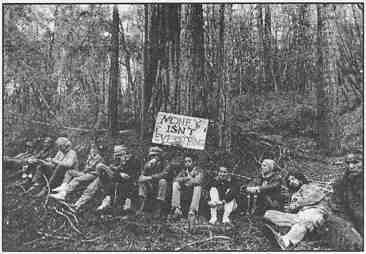
Oct 23, 2021 Read the whole text...
T. Fulano (David Watson)
The Annunciation of the Papal Visit to Detroit
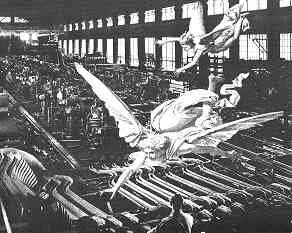
All the city mourns, and the crumpled masses languish at the gates, and the cry of all the freeways has gone up.
The politicians have sent their runners to the waters, but they have come with all their vessels empty.
The limousines fester in long lines like links of meat waiting to be roasted in the devil’s barbecue.
Feb 11, 2018 Read the whole text...
John Moore
The Appeal of Anarchy
Amidst ecstatic visions, Anarchy appears. She says:
Whenever you need anything, once a month at the full moon, assemble in the wilderness—in the forest, on the heath, by the seashore—for the state of nature is a community of freedoms. Recognize the imminence of total liberation and as a sign of your freedom, be naked in your rites.
Oct 9, 2021 Read the whole text...
John Moore
The Appeal of Anarchy

Amidst ecstatic visions, Anarchy appears. She says:
Whenever you need anything, once a month at the full moon, assemble in the wilderness--in the forest, on the heath, by the seashore--for the state of nature is a community of freedoms. Recognize the imminence of total liberation, and as a sign of your freedom, be naked in your rites.
Feb 16, 2014 Read the whole text...
George dePue
The Arrangement, John & Mary
Film review
Newsreel-ARM — Hollywood began to appreciate some years ago that the vision of life it was projecting for the people was increasingly irrelevant to their lives and uninteresting. It was a basic marketing problem—how to catch up with a broad social process that has some of the aspects of pre-revolutionary alienation from the system, without giving into it and confirming its concrete revolutionary potential?
Jul 7, 2023 Read the whole text...
Peter Lamborn Wilson
The Art of Not Being Governed
a review of
James C. Scott, The Art of Not Being Governed: An Anarchist History of Upland Southeast Asia. Yale University Press, 2009, cloth, 442 pp., $35
How could any black-and-red-blooded anarchist resist a book with this title?
Admittedly, it’s an expensive treat, but I’m very glad at last to discover a writer I should already have known: James C. Scott, who (like David Graeber) is an anthropologist at Yale and a self-confessed anarchist.
Mar 29, 2014 Read the whole text...
Phil Bailey
The Art of Richard Levins Morales
Telling our stories and holding our ground
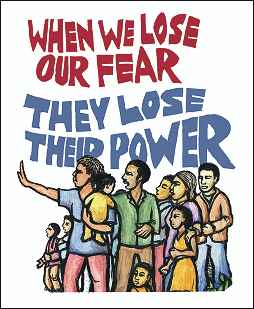
The art of Ricardo Levins Morales is rooted in the soil of the struggles that shape our lives. Inspiring, empowering and validating, his images both document and embody collective visions of unity in the face of power.
As a result of working with the Northland Poster Collective in South Minneapolis for over thirty years, Levins Morales has developed core insights about how art can be a powerful part of strategy in movements.
May 5, 2019 Read the whole text...
Mitchel Cohen
The Assault on the Pentagon
The 1967 March 25 Years Later
October 21, 1992 marked 25 years ago that a huge anti-war demonstration swept past the Lincoln Memorial in Washington, D.C. and over the bridges into Virginia, wave after wave of young anti-warriors crashing against the walls of the Pentagon.

Mar 3, 2020 Read the whole text...
Frank Dedenbach
Theatre
A Thurber Carnival
On September 2, 3 and 4 the Lafayette Park Players presented their production of “A Thurber Carnival” at the Chrysler School Auditorium. The cast has worked together only once before last fall in “Monique”; and, although the program notes show that many members have extensive background in other plays, the amateur character of this attempt was painfully obvious.
Apr 28, 2023 Read the whole text...
Frank H. Joyce
The “Bad” Americans
Editorial
The events of the week of anti-war resistance which began October 16, and which have continued to this writing—including the assault on the war profiteers at the Rackham Building on Wayne State’s campus on October 24 and 25—are of profound significance for the nation and the Movement.
Thousands of whites have in fact moved from protest and dissent to resistance. As many black people were forced to do some years ago, increasing numbers of whites have been forced to conclude that the government is illegitimate. The “legal” structures for change which are presumed to exist in this country are in fact meaningless. White people, in short, do not have any power either—or at least they do not have the power to change anything, only the power to acquiesce. Congress has been petitioned. The Executive has been implored. And still babies die. “Napalm is Johnson’s Baby Powder,” said one sign.
Dec 17, 2022 Read the whole text...
Marieke Bivar
The Bad Victim
The psyches of young girls and their resilience
a review of
Reeling by Lola Lafon, translated from French by Hildegarde Serle. Europa Editions 2022
When violent acts seem isolated, rash, inexplicably singular, this gives all those forced to witness or have knowledge of it a way out. To rest somewhat easy in the knowledge that the particular and specific circumstances under which the violent acts took place are unlikely to reoccur.
Jul 29, 2024 Read the whole text...
anon.
The Banning of the Mural
In fall 1997, in Sechelt, a small coastal town in southwest British Columbia, Canada, Jamie Elder, owner of the Unity Skateboard Shop and drop-in point for local youth, approached me about painting a mural on the side of the trailer that housed his store which faced the highway directly opposite from a McDonald’s.
Feb 21, 2015 Read the whole text...
Fifth Estate Collective
The Barn
Infoshop, bookstore and clubhouse
In the hills of Tennessee, about an hour east of Nashville, on the outskirts of Dismal (population zero), there exists a barn. It’s an ordinary old barn from all outward appearances—except for a few anti war banners and the buzzing, whirring hum of electricity. Inside, the scene is anything but what Ma and Pa Kettle would have intended.
Aug 26, 2017 Read the whole text...
Fifth Estate Collective
The Barn
Infoshop, Bookstore & Clubhouse
Bill Ayers
Fugitive Days (2001) $10
James Bell
The Last Wizards (2002) $5.00
Alexander Berkman
Prison Memoirs of an Anarchist $15.00
— What Is Anarchism? $14.00
Hakim Bey
Millennium (1996) $8.00
— Immediatism (1992) $10.00
— T.A.Z.: The Temporary Autonomous Zone (1991) $8.00
Bureau of Public Secrets
Jul 19, 2016 Read the whole text...
Fifth Estate Collective
The Barn
Infoshop, Bookstore and Clubhouse
Send check, money order, or well concealed cash to:
Fifth Estate Books
PO Box 6
Liberty, TN 37095
Please add $2 shipping/handling for first item, $1 for the second and subsequent one, etc...
Thanks for your recent order!
Most book and CD purchases come with a surprise sampling of current zines and radical propaganda.
Jan 10, 2017 Read the whole text...
Fifth Estate Collective
The Barn
Infoshop, Bookstore & Clubhouse
When you order books from the Barn, you support a collective and help keep the Fifth Estate physical space solvent. With your help, we’re trying to sustain an alternative to the commercialism of retail or web-based booksellers.
NEW Globalize Liberation: How to Uproot the System and Build a Better World. Edited by David Solnit. Almost 500 pages! City Lights. 2004. $18. See the review on page 50.
Jun 17, 2016 Read the whole text...
Fifth Estate Collective
The Barn
Infoshop, Bookstore & Clubhouse
The barn is bursting with new titles & more to come. If you’d like us to review and/or distro your independent publication, bring it on
Midnight Notes, Auroras Of the Zapatistas (2001) $14.00
James Bell, The Last Wizard (2002) $12.00
Paul Garon, The Devil’s Son-in-Law: Petiie Wheatstraw (2003) $15.00 (w/CD)
Nov 23, 2017 Read the whole text...
Fifth Estate Collective
The Barn
Book distribution has been a mainstay of our collective for many years. We believe that reading can be a revolutionary activity, and in that spirit, we continue this service.
We feature books by Fifth Estate editors, contributors, collaborators, friends, and other books that have either been read or recommended by members of the collective. If you have a book you’d like to see offered here, send it along. Like the magazine, this project is volunteer-run and all proceeds go back into the collective.
Mar 16, 2014 Read the whole text...
Liberation News Service
The Battle at Brockdorf
First Person Account from W. Germany
<em>
Staff Note:</em> The following is a first-hand account of the demonstration and events leading up to it. See also in this issue: West German Protest.
BROCKDORF, Germany (LNS)—Up to now we have used only legal ways—filing lawsuits and so on—but have always made it clear that if legal means didn’t work, we would occupy the site, as was done in Whyl.
Sep 27, 2016 Read the whole text...
No Picnic
The Battle for France
May/June 1968
FE Note: What follows are thoughts on the revolutionary upsurge which shook France 20 years ago. Although ultimately unsuccessful, the message is that revolt is possible in modern society. In ours today, it is not the cops which prevent revolt, but the inertia of what is--the weight of the present.
The introductory section is from the fine new magazine, No Picnic, Spring 1988, Box 69393, Stn. K, Vancouver BC, Canada V5K 4W6; $1.50 per issue. The piece from Fredy Perlman, written from a participant’s viewpoint, appeared in Worker-Student Action Committees, co-authored by R. Gregoire, 1968, $2 from FE Books. The excerpt from Jacques Camatte appeared originally in FE #295, November 3, 1978 and is available at $1. Also recommended is Paris: May 1968, by Solidarity, available from FE Books for $3.
Nov 14, 2020 Read the whole text...
Dennis Raymond
The Battle of Algiers
a review of
“The Battle of Algiers”
How surprised we were three years ago by the success of “To Die in Madrid,” Francisco Rosi’s remarkable compilation of old news films from the Spanish Civil War. The distinction of that film was the poetic way in which it shaped and explained the ironic progress and outcome of the struggle. And now we have a new film, though in much the same vein, which is historically more immediate.
Dec 13, 2019 Read the whole text...
Rick London
The Battle of Chicago
Editors’ Note: The Fifth Estate contains virtually no news coverage of the Battle of Chicago. For once the overground media did its job and to repeat the horror stories here would only be redundant. Rather, we feel that it is important to put the Chicago events within a perspective and provide an analysis of the events that occurred.
Aug 14, 2015 Read the whole text...
Caw! Magazine
The Battle of France: May ’68
During the months of May and June 1968, the mass strikes and uprisings that occurred in France shook the foundations of an unsuspecting world. This crisis for capital appeared at a time when newspapers like The New York Times and le Monde were describing the French people as bored and lethargic and they weren’t completely inaccurate—the French were bored with their lives under capitalism and their boredom exploded onto the streets of Paris on May 18th creating a new reality for several weeks.
Aug 15, 2018 Read the whole text...
Marie Mason
The Battle of the Story of the Battle of Seattle
A review of
The Battle of the Story of the Battle of Seattle, David Solnit and Rebecca Solnit, AK Press, 2009, $12, www.akpress.org
Having been in Seattle for the “insurrection” against the World Trade Organization (WTO) in 1999, I looked forward to reading David Solnit’s account of the days leading up to November 26 and his interpretation of the aftermath of those events. I took part enthusiastically in many of the demonstrations and blockades of which he writes, and ran in the Black Bloc.
Feb 10, 2014 Read the whole text...
Jason Rodgers
The beasts of the Southwest desert have a message for us
a review of
A Desert Pilgrim’s Bestiary by Anthony Walent, author; Maurice Spira, Illustrator. Eberhardt Press, 2019
A Desert Pilgrim’s Bestiary is both archaic and modern. Anthony Walent has been employing this very tension in his zine, Communicating Vessels, for many years, that is assembled and designed using functioning, but antique typesetting equipment.
Jan 15, 2023 Read the whole text...
Fifth Estate Collective
The Beatle in the Circus
LONDON (PWS) Beatle John Lennon is scheduled to head the list of guest stars set for the Rolling Stones’ first American television special, “The Rolling Stones’ Rock and Roll Circus.” Lennon, along with Eric Clapton, Keith Richard, and Mitch Mitchell of the Jimi Hendrix Experience, will form a supergroup especially for the show.
May 2, 2021 Read the whole text...
Larry Miller
The Beatles in Detroit
Teens Climax Hectic Evening
There I was, right in the exact middle of it... most of that which had gone before merely served to strain my patience... had to go out several times for a cigarette, drink of water...when they finally came on, it was several seconds before I realized that this was it...every single one of these hideous creatures standing on top of the seats, screaming... the light from the thousands of popping flashbulbs was like some strange acid-inspired lightning, accompanied by this strange high pitched squealing thunder...retreated to the balcony, shaken by the intensity of the pure energy unleashed there in that weird electriarena... Migod, it was Romans and Christians and Lions all over again...once safe up above, away from the insane mass orgasm, I could see just what was really happening...the music was probably the worst pap they could have done... the reason obvious...these savages just would not LISTEN to the good stuff, the real art...they don’t have the vaguest idea of what these Beatles can do With sounds and words...so they get just exactly what they deserve, the crap, the screamers, the noise and shouting...and according to the ritual, the girlies faint and charge the stage, actually throw dangerous weapons at them...an attempt at communication with the fantasy come to life. So the Beatles concert turns out to be a big slap in the face, a musical screw-you aimed at the pre-pubic non-minds who sleep with their John Lennon dolls, trying to work off the forbidden orgasms. Money or no money, I do not want to be a rock-and-roll star. These cats were lucky to escape with their lives. And this was a lot quieter than the last time around.
Apr 16, 2023 Read the whole text...
E.B. Maple (Peter Werbe)
The Berkman Conference
A few days before the commencement in Pittsburgh of the July 23rd conference, “A Remembrance of Alexander Berkman, The Man Who Shot Frick,” Sunfrog and I headed for a little town on the Pennsylvania/West Virginia border called Confluence where several rivers come together. We figured if rafting was good enough for Earth First! founder, Dave Foreman, maybe we should give it a try as well.
Jan 29, 2020 Read the whole text...
Andrei Codrescu
The best human gift is perspective
it’s also the worst
when used in circumstances calling for a closeup
or in circumstances that call for detachment
it is only a gift when it employs the appropriate distance
that minimizes pain
between the observer and the observed
.
we have a school for teaching appropriate distance
it’s called a slum a favella
Jan 9, 2022 Read the whole text...
Fifth Estate Collective
The Big March
Cover story
On Saturday, March 26, demonstrations protesting the war in Vietnam were held in Detroit as this city’s effort in the Second International Days of Protest. In preparation for this event, sponsored by the Detroit Committee to End the War in Vietnam, Women for Peace, Detroit Citizens for Peace and Trade Unionists for Peace, more than 20,000 leaflets were distributed and advertisements appeared In the Detroit News and various campus and community newspapers.
Sep 2, 2015 Read the whole text...
Hank Malone
The Big Party
The anatomy of a grand party in Detroit where we find a famous visiting poet, a famous black revolutionary, and a famous psychiatrist talking with the rich and the bored and everyone else.
Mrs. Stuyvesant Fish’s original monkey dinner was held at 19 Gramercy Park in New York in 1908, wherein Mrs. Fish invited the “haute monde” of her day, according to writer Tom Wolfe, to a dinner in honor of the Prince del Drago.
Of course, nobody bothered to ask who the prince was, but they all came, and there was the Prince, a full-grown Chambezi baboon in evening clothes, fitted in a wing collar and tails. This grand gesture was Mrs. Fish’s way of showing how strange “society” had become in her day, willing to go anywhere for whatever purpose, if it seemed grand and gay enough.
Feb 10, 2019 Read the whole text...
A. R.
The Big Picture about the Bad News
You’re in it! You see it all! You know where you stand.
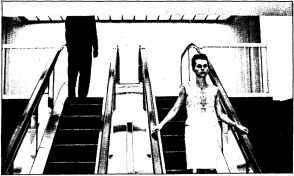
Under the dull security and passive spectacle characterizing the total routine of everyday life in modern society lies the unmistakable framework of a withered and decayed social structure evading the grave in frantic pursuit of an eternal market of subservient: human beings. No such market exists anymore. Capital’s-own child, technology, has seen to that.
Dec 19, 2013 Read the whole text...
Fifth Estate Collective
The birds, the bees, and anarchy
Issue Introduction
The theme of this issue is Sex. The very word can elicit emotions from delight to anxiety. However, those reactions aside, the central function of sex, from mega fauna to microbes, is the reproduction of the species. It is only human sexuality which is over laden with social scripts that translate into pleasure or pain, often on a large cultural scale.
Sep 12, 2013 Read the whole text...
Vachel Lindsay
The Black Hawk War of the Artists (1914)
August 2, 2007 was the 175th anniversary of the Bad Axe massacre, when US soldiers, settler militias, and army gunboats slaughtered Sauk (Osakiwug), Fox, and Kickapoo Indians following the Battle of Wisconsin Heights. This mass killing effectively put an end to the Black Hawk Wars.
The wars, named for what the British had given the indomitable war chief Ma-Ka-Tai-Me-She-Kia-Kiak, began with conflict over long-simmering objections to the 1804 treaties. Black Hawk was captured, imprisoned, and put on public display all over the US. He later fell ill and died in Iowa.
Oct 6, 2014 Read the whole text...
Black Panther Party
The Black Panther Party Program
What we Want, What we Believe
1. We want freedom. We want power to determine the destiny of our black community.
2. We want full employment for our people.
3. We want an and to the robbery by the white man of our black community.
4. We want decent housing, fit for shelter of human beings.
5. We want education for our people that exposes the true nature of this decadent American society. We want education that teaches us our true history and our role in the present day Society.
Aug 8, 2019 Read the whole text...
Guyora Binder
The Black Sea Monster
There is a monster outside of our window.
The monster roars and shudders; threatens, blusters; blows off steam and rusts. It is a beast of the sea; it is a massive machine; it is dangerous; it is explosive; it has no jaws, but a smaller subtler and more secret weapon... It is crawling with maggots.
Feb 23, 2016 Read the whole text...
Carrie Laben
The Booksellers of our Better Nature
New York City. March 2020, the first days of the crisis that would define the year. The words “mutual aid” began to appear where they’d not been seen before, from lamp post flyers to Reddit neighborhood forums.
Everyone from New York Governor Andrew Cuomo to Britney Spears was using the expression. Loosely organized groups ran errands and made deliveries. Friends sewed masks for friends, then for friends of friends. And well before the summer’s boiling-over of righteous rage at police brutality, sustained protests attempted to hold Cuomo and the prison system accountable for leaving incarcerated at-risk people in facilities like Rikers Island, which became a hotspot for COVID.
Aug 1, 2021 Read the whole text...
David Gaynes
The Boxer
Here are four records you might want to have:
-
Otis Spann: Sweet Giant of the Blues, Bluestime BTS-9006.
-
Harmonica Slim: The Return of Harmonica Slim, Bluestime BTS9005.
-
T-Bone Walker/Joe Turner/Otis Spann: Super Black Blues, Bluestime BTS-9003.
-
Earl Hooker: Don’t Have to Worry, Bluesway BLS 6032.
Jun 19, 2023 Read the whole text...
Dennis Raymond
The Bride Wore Black
a film review of
“The Bride Wore Black”
Francois Truffaut’s “The Bride Wore Black” is terrific. Infused with his patented brand of gentle humor, the film is a modern horror story in which lovely Jeanne Moreau goes about methodically murdering five gentlemen with an iron calm and comic sunniness. Essentially an entertainment movie, a minor effort for Truffaut, other films of similar genre pale beside it.
Dec 13, 2019 Read the whole text...
Carl Hughes
George Lakey
The Brighter Side of Conflict
Interview with Activist George Lakey
Most of us don’t like dealing with conflict in movement politics. There are times when our projects are rolling along smoothly and then we hit a point of contention and suddenly the room is full of tension and discord.
For many people, the reaction is to try and restore order by quelling the discontent and moving onto other matters.
May 6, 2019 Read the whole text...
Helen Keller
The Burden of War
“Menace of the Militarist Program” (1915)
The burden of war always falls heaviest on the toilers. They are taught that their masters can do no wrong and go out in vast numbers to be killed on the battlefield. And what is their reward? If they escape death they come back to face heavy taxation and have their burden of poverty doubled. Through all the ages they have been robbed of the just rewards of their patriotism as they have been of the just rewards of their labors.
Sep 26, 2017 Read the whole text...
Fifth Estate Collective
The Calm before...What?
Issue intro

Sharks dive deeper before hurricanes. Wolves howl when a storm is approaching. Snakes slither away from earthquakes. Something’s happening here, and definitely, what it is ain’t exactly clear. Unfortunately, our intellects don’t provide us the instinctual early warning system our animal cousins possess.
Jul 25, 2024 Read the whole text...
Don LaCoss
The Car Bomb
Poor Man’s F-16
reviewed in this article
Buda’s Wagon: A Brief History of the Car Bomb, by Mike Davis, 2007, Verso, 228 pp., $22.95
Mike Davis argues forcibly that the “vehicle-borne improvised explosive device” (in Pentagon parlance) is a weapon of mass destruction. Keying in on the terrible effectiveness of this weapon (“an inconspicuous vehicle, anonymous in almost any urban setting, to transport large quantities of high explosive into precise range of a high-value target”), Davis underscores the inevitability of its proliferation as globalized capitalism industrially overdevelops every corner of the world, “like a kudzu vine of destruction taking root in the thousand fissures of ethnic and religious enmity that globalization has paradoxically revealed.”
Aug 21, 2014 Read the whole text...
John Zerzan
The Case against Art
Art is always about “something hidden.” But does it help us connect with that hidden something? I think it moves us away from it.
During the first million or so years as reflective beings, humans seem to have created no art. As Jameson put it, art had no place in that “unfallen social reality” because there was no need for it. Though tools were fashioned with an astonishing economy of effort and perfection of form, the old cliché about the aesthetic impulse as one of the irreducible components of the human mind is invalid.
Nov 7, 2020 Read the whole text...
Alon K. Raab
The Centralia Massacre
Following World War I a Wobbly is lynched by the American Legion
As we travel north on Oregon’s Highway Five, from Portland towards Seattle, places and names go by: Castle Rock, Cougar, Mt. St. Helens, Onalaska. A November rain is falling, light rain, blessed rain. We cross the Chehalis river and then approach Centralia, Washington.
There are places whose names remain connected with the past, with a specific event that will forever remind strangers of their existence. Bhopal, Selma, Auschwitz, Soweto and Chernobyl are such places. People begin lives anew on those sites, building houses, giving birth, loving, but the associations persist. Centralia also has its beast of memory.
Apr 9, 2016 Read the whole text...
Brian Flanagan
The Ceremony

(Taurus/Detroit)
“dearly beloved, we are gathered here today in...
...detroit, michigan/home of the “motown sound”/g.m./ford motor/chrysler/rats in the kitchen and roaches in the bathroom/ no heat in winter & nothing cool when the summer comes/pistons pounding out a DRUM beat...do you take...to love & cherish... woodward ave./junkies/whores/& little kids on the way up to take their places/a dime bag to get the day over with...and do you take to have and to hold...the day shift, afternoon shift, midnights—at least 8 hrs w/the devil in hell/rouge, chevy, fisherbody (makes dead bodies), budd, eldon gear & axle, dodge main, jefferson, iron foundries & specialty forge foundries/monsters that eat alive & spit out bloody hands/feet & pieces of skin & bone/ & w/ regularity—a DEAD BODY...friday nite...get that check/carry it on home to the crib (w/wife & kids)/then get out on the street/get fucked up/(reefer, jones, coke, ups & downs, johnnie walker black & red)/try to freeze yr head/can’t think about the shit starting all over again on mon./”...and now a message from our sponsor” ...watch t.v./listen to the radio/read papers/they all say: “buy this, do that & u can be a success.”/damn brothers/sisters/a success in this motorized/concrete/iron & steel jungle is just staying alive!!!
Jul 19, 2025 Read the whole text...
Sylvie Kashdan
David Brown
Ron Reed
The Challenge Accepted
Comments on Prisons & Prisoners
In response to “A Challenge to the Prison Movement,” FE #307, November 19, 1981.
Sylvie Kashdan, Seattle
In its mirror image negation of some positions of the prisoner support movement, the anonymous article highlights weaknesses of such single-issue politics. In focusing so completely on this one institution (the prisons), it becomes impossible for people to imagine its elimination.
Jan 1, 2019 Read the whole text...
Chris Singer
The Chicago Conspiracy
CHICAGO—The repression that many have forecast may have come.
On September 9, 1968, Judge William J. Campbell charged a 23-man grand jury with the job of investigating the violence in the streets of Chicago that occurred during the week of the 1968 Democratic National Convention.
Last week the grand jury, in a remarkable political balancing act, returned indictments against 17 persons: eight Chicago police; eight persons allied with the movement; and, one member of the fourth estate, a suspended NBC News executive.
May 7, 2022 Read the whole text...
Shirley Hamburg
The Cinephile
Joseph Strick’s film adaptation of Ulysses is rather like a high-minded comic-strip version of Stephen Hero or Dubliners.
On the few occasions when a bit of genuine Joycean complexity is allowed to survive in the midst of all that jolly, naturalistic Irishry, it strikes one as self-conscious and out of place. To make the film less expensive to produce, it has been updated, so that all the Celtic Twilight and Irish revolutionism had to be dropped, and much that is left (like the references to England being taken over by a Jew) is out of keeping.
Jul 8, 2025 Read the whole text...
Shirley Hamburg
The Cinephile
A Man For All Seasons may not be a play for all seasons, but it certainly is a godsend in this particularly impoverished one. A good deal has been written elsewhere about this commendable but somewhat less than considerable play.
In adapting his work for the screen, Robert Bolt once again both idealized and oversimplified Thomas More, who was, at times, both more religiously fanatical and broadly facetious than Bolt’s protagonist. By giving us such a flawless man, Bolt gives us a flawed play and film. From the film, moreover, some of the play’s strongest and wittiest lines have been excised.
Jun 16, 2025 Read the whole text...
Shirley Hamburg
The Cinephile
Michelangelo Antonioni’s BLOWUP, to paraphrase Archibald MacLeish, is a film that means more than it is. Even if people are lost souls, as those in the film certainly are, their relationships to one another, to their surroundings, to the work of art in which they figure should be firmly apprehended and made convincing. Instead, the film’s meaning is wide-open, so much so that I wonder if the Detroit release did not have sections necessary to the development extracted.
May 1, 2025 Read the whole text...
Shirley Hamburg
The Cinephile
Having surveyed the recent New American Cinema products, one might easily be tempted to remain silent until an achievement of greater substance presents itself for evaluation. Yet, since an authentically New American Cinema is the concern of any conscious film artist, he must accept what is available as a concrete basis and subject it to a definite scrutiny, before he can discard or transcend it. For, assuming the existence of talent, it has precisely been a view of life without ideas, and a conception of art without theory that has prevented most of the New American Cinema film-makers from becoming true artists and thus the true spokesmen for their generation.
Apr 24, 2025 Read the whole text...
Shirley Hamburg
The Cinephile
“We’ll save it in the editing.”
Though true of James Cruze, Griffith, Stroheim, this maxim was hardly any longer true of Murnau, Chaplin, and becomes irretrievable untrue with sound film. Why? Because in a film such as Eisenstein’s “October” (and still more so with “Que Viva Mexico”) editing is above all the supreme touch of direction. Elena, just as Mr. Arkadin, is a model of editing because each in its class is a model of directing.
May 1, 2022 Read the whole text...
Shirley Hamburg
The Cinephile
In adapting a bulky, densely detailed novel of seven volumes, Mai Zetterling has extricated the following schema in her movie, “Loving Couples:” her three women have in common a place and a time of arrival, the hospital, set immediately at the beginning of the film; a starting time, childhood; a central time and place, the chateau and the longest night, Midsummer. This schema orders and disorders brilliantly the destiny of the three lives in which childhoods, love affairs, childbearings correspond to one another.
May 17, 2017 Read the whole text...
Carlos Semprún Maura
The CNT in Modern Spain
The Weight of the Dead and Dead Weight
Note: The following article was translated from the readers’ soapbox page of the June 1, 1978 issue of Solidaridad Obrera (C/. Princesa, 56, entlo, 1a, Barcelona, Spain), organ of the C.N.T. of Catalonia.
Since last May, Solidaridad Obrera seems to have gone through quite a change in its content and has found itself in conflict with the C.N.T. nationally. In a recent issue of the bulletin Echanges (no. 16, July 1978), they state: “...this is an official paper of the C.N.T. it appears that the editorial staff of this paper has undergone changes incorporating elements who do not support any union including the C.N.T. It remains to be seen how long they will keep the editorship of the paper, for it is clear now that the C.N.T. nationally (headquarters Madrid) is pursuing a more and more strictly syndicalist line, expelling or criticising sections or groups considered to be ‘assemblyist” i.e. for the power of the mass meeting.”
Aug 16, 2018 Read the whole text...
John Sinclair
The Coatpuller
People seem not to believe me when I say the Artists’ Workshop needs money to operate, or Trans-Love needs money, or the Sun needs money—but it’s true. I know it shouldn’t be that way, people, but this is America and you don’t even get a place to stay without paying some property-owner for it. Month after month we scuffle and hassle to get enough money to pay the rent ($200), the gas and electric (although not the gas any more, since it’s been shut off), the telephone bill ($75 or so), and hundreds of little bills which mount up every time we move to expand the operation in another direction.
Jul 4, 2025 Read the whole text...
John Sinclair
The Coatpuller
The Detroit Love-In, to be held on Belle Isle April 30th, will be the first large-scale manifestation of the New Spirit of Detroit, and everyone who feels that spirit and believes in it, and everyone who doubts it or would deny it, should be there to make it public once and for all.
Other events scheduled for the Trans-Love weekend include a tree dance/concert Friday night in the Mart Room at WSU (on the second floor of Mackenzie Hall, Cass and Putnam), with the great Seventh Seal donating their music and energy for their people. Everyone is welcome. On Saturday night, the 29th, Trans-Love will sponsor a huge music explosion in the Community Arts Auditorium, Cass and Kirby, on the Wayne campus.
Jun 11, 2025 Read the whole text...
John Sinclair
The Coatpuller
Detroit has been a stubborn place and does not want to be changed, but as I write now and the sun is shining through my window and the spring is with us, the snow is melting, people are getting together, and there are positive forces at work here that will not be denied. Yes. We can not be stopped, no we can’t, and the sooner the people in power realize our strength the better off they’ll be. Change is in the air, the beautiful people are swarming the streets, travelers are coming home at last, flowers will be blooming everywhere, and all who have eyes to see will tell you it will be beautiful. Yes. And you will believe it when you see it.
May 9, 2025 Read the whole text...
John Sinclair
The Coatpuller
On Valentine’s Day at WSU a strange coalition was effected and the Student-Faculty Council ended up sponsoring a “Bitch-In” on campus, which was an honorable attempt to move from the usual “left-hippy” practice of simply haranguing everyone, to pointing out the similarities of concern and interest among all students and young people generally and making those similarities known by attempting to gather the different people together to “bitch” at the University for all its weird practices. The general purpose of the Bitch-In failed to make itself known or felt, but one or two beautiful things happened which made the attempt really worthwhile.
Apr 30, 2025 Read the whole text...
John Sinclair
The Coatpuller
The Marijuana Scare is getting weirder and weirder, with the grass police moving backwards faster every day, trying to bust everybody they can before the laws won’t let them do it any more. As far as I’m concerned the busts first in Detroit, and now at Grosse Pointe and Livonia high schools, are the best thing that could have happened at this time—short of legalizing grass altogether, of course. Because the only way the police have been able to keep up their screen of lies and fear is by keeping it all “under ground,” where no straight people could see what was happening. Now, with the silly narcotics police breaking in on their sons and daughters almost every day, the middle-class citizens of our time are beginning to wonder about marijuana prohibition—and it’s just about time.
May 16, 2025 Read the whole text...
John Sinclair
The Coatpuller
THE POEM FOR WARNER STRINGFELLOW
OCTOBER, 1966
Detective Lieutenant, Detroit Narcotics Squad, who has been single-handedly responsible for busting me on two separate occasions for possessing & selling marijuana
and who stumbled into my new apartment last night by accident
over a year since the last time he saw me
Mar 2, 2025 Read the whole text...

